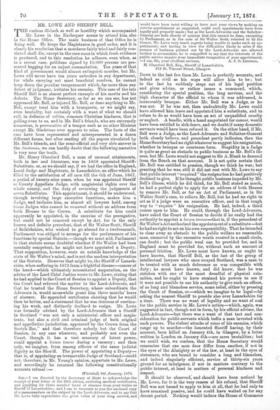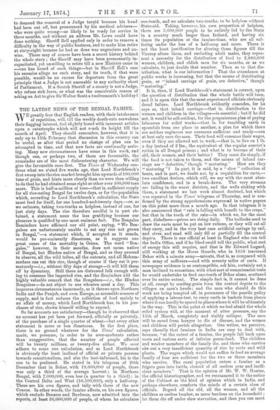MR. LOWE AND SHERIFF BELL. T HE curious ill-luck as well
as hostility which accompanied Mr. Lowe in the Exchequer seems to attend him also in the Home Office. The main business of that Office he is doing well. He keeps the Magistrates in good order, and it is clearly his resolution that a murderer fairly tried and fairly con- victed shall die, except in the rare cases in which fresh evidence is produced, and to this resolution he adheres, even when, as in a recent case, petitions signed by 10,000 persons are pre- sented begging for an unjust commutation. Ten years of that kind of government would almost extinguish murder, but Mr. Lowe will never have ten years unbroken in any department, for while carrying out most beneficial resolves, he cannot keep down the peculiar temperament which, far more than any defect of judgment, irritates his enemies. This case of the late Sheriff Bell is an almost perfect example of his merits and his defects. The Home Secretary, as far as we can see, has not oppressed Mr. Bell, or injured Mr. Bell, or done anything to Mr. Bell, except treat him with a brusquerie, or we might say, even brutality, but certainly with a want of what we should call, in defiance of critics, common Christian kindness, that is galling even to us, and in Mr. Bell's friends, who are extremely numerous, is provocative of a temper such as no other Minister except Mr. Gladstone ever appears to raise. The facts of the case have been represented and misrepresented in a dozen different forms, but after reading all the papers circulated by Mr. Bell's friends, and the semi-official and very able answer in the Scotsman, we can hardly doubt that the following narrative is very near the truth.
Mr. Henry Glassford Bell, a man of unusual attainments, both in law and literature, was in 1838 appointed Sheriff- Substitute, or, as we should say, if we had the office in England, Local Judge and Magistrate, in Lanarkshire, an office which he filled to the satisfaction of all men till the 6th of June, 1867, a period of twenty-nine years, when he was appointed Sheriff or County Appellate Judge, with magisterial rights over the whole county, and the duty of reviewing the judgments of seven Substitutes. This appointment, it should be understood, though involving large executive functions, makes him a Judge, and includes him, as almost all lawyers hold, among those Judges who cannot be removed without an address from both Houses to the Crown. A substitute for him could apparently be appointed, in the exercise of the prerogative, but could not be removed except by Act, for in the only known and definite precedent, that of Sir Walter Scott, Sheriff of Selkirkshire, who wished to go abroad for a twelvemonth, Parliament was obliged to arrange for the performance of his functions by special Statute,—though we must add, Parliament in that statute seems doubtful whether if Sir Walter had been mentally competent, he might not have appointed a Deputy. That supposition, however, rests on outside knowledge of the state of Sir Walter's mind, and is not the modern interpretation of the Statute. However that might be, the Sheriff of Lanark- shire, when suffering in 1873 from a frightful disease—cancer of the hand—which ultimately necessitated amputation, on the advice of the Lord Chief Justice wrote to Mr. Lowe, stating that he had applied to the Court of Session to appoint a Deputy, that the Court had referred the matter to the Lord-Advocate, and that he trusted the Home Secretary, whose subordinate the Advocate is, would meanwhile grant him three months' leave of absence. He appended certificates showing that he would then be better, and a statement that he was desirous of continu- ing his work, and distinctly declined to resign. Mr. Lowe was formally advised by the Lord-Advocate that a Sheriff in Scotland "was not only a ministerial officer and magis- trate, but also a civil and criminal judge of both original and appellative jurisdiction, appointed by the Crown from the Scotch Bar," and that therefore nobody but the Court of Session, in any case whatever, and probably not even the Court, though it has a vast armoury of latent power, could appoint a locum tenens during a vacancy ; and then only, we imagine, from among officers of the same judicial dignity as the Sheriff. The power of appointing a Deputy— that is, of appointing an irremovable Judge of Scotland—could not, therefore, in Mr. Young's opinion, appertain to Mr. Lowe, and accordingly he returned the following constitutionally accurate refusal :— Whitehall, 6th January, 1874.
Sts,—I am directed by the Seoretary of State to acknowledge the receipt of year letter of the 20th ultimo, enolosing medical certificates, and applying for three months' leave of absence from your ditties as Sheriff of Lanarkshire ; and I am to transmit to you the enclosed copy of a memorandum on the subject by the Lord-Advocate, and to say that Mr. Lowe fully appreciates the great value of your long service, and
would have been most willing to have met your views by making an interim appointment as suggested, could such appointment have been legally and properly made; but as the Lord-Advocate and the Solicitor. General are both clearly of opinion that this cannot be done, excepting by Parliament, as in the case of Sir Walter Scott, referred to by the former, Mr. Lowe very much regrets being unable to make such an ap- pointment; and having in view the difficulties likely to arise if the arrears of business pointed out by the Lord-Advocate are allowed further to accumulate, he is compelled to say that the interests of the public service require year immediate resignation of your appointment. —I am, Sir, your obedient servant, A. J. 0. LLDDELL. H. Glassford Bell, Esq., Sheriff of Lanarkshire, 212 St. Vincent Street, Glasgow.
Down to the last few lines Mr. Lowe is perfectly accurate, and indeed as civil as his ways will allow him to be ; but in the last he suddenly steps out of his legal position and gives advice, or rather issues a command, which, considering the special position, the long services, and the hieh character of the official to whom it was addressed, is inexcusably brusque. Either Mr. Bell was a Judge, or he was not. If he was not, then undoubtedly Mr. Lowe could have allowed him leave and appointed him a substitute, and to refuse to do so would have been an act of unqualified cruelty or neglect. A beadle, with a hand amputated for cancer, would have been entitled to sick-leave, and we doubt if many domestic servants would have been refused it. On the other hand, if Mr. Bell were a Sedge, as the Lord-Advocate and Solicitor-General both clearly believe, and precedent partly indicates, then the Home Secretary had no right whatever to suggest his resignation, whether in brusque or courteous form. Stupidity in a Judge is quite as great an obstacle to public business as Mr. Bell's ill- ness, but Mr. Lowe would not suggest to Sir A. Blank to descend from the Bench on that account. It is not quite certain that Mr. Bell was entitled to pension, though we think he was; but granting that he was, still it did not rest with Mr. Lowe to say that public interest "required" the resignation he had positively declined to give. If he thought public business impeded by Mr. Bell's illness, which he did think, for Mr. Bell stated as much, he had a perfect right to apply for an address of both Houses to remove Mr. Bell, or for -an Act of Parliament, as in Sir Walter Scott's case, to relieve Mr. Bell, but he had no right to act as if a judge were an executive officer, and in that rough way to " require " his resignation. He had, indeed, a third course open to him. He could, through the Lord-Advocate, have asked the Court of Session to decide if he really had the authority to appoint a locum tenens—that is, if the precedent of Sir Walter's Act authorised the appointment of a substitute—but he had no right to act on his own responsibility. That he intended to clear away an obstacle to the public welfare no reasonable man, unmoved by the excessive wrath created in a small circle, can doubt ; but the public weal can be provided for, and in England must be provided for, without such an amount of personal friction. Mr. Lowe must have known, or ought to have known, that Sheriff Bell, as the last of the group of intellectual lawyers who once swayed Scotland, was a man to be treated with as much deference as was compatible with duty ; he must have known, and did know, that he was stricken with one of the most dreadful of physical cala- mities, and he ought to have strained his powers to see if it were not possible to use his authority to give such an officer, of so long and blameless service, some relief, either by pressing the Court of Session, or—which we imagine to be legal—by asking the nearest Sheriff to preside also over Lanarkshire for a time. There was no want of legality and no want of zeal for the public service in Mr. Lowe's action—which, again, was suggested in fact, though not in form, by his official adviser, the Lord-Advocate—but there was a want of that tact and con- sideration for public servants which befits a man invested with such powers. The violent attacks of some of his enemies, which range up to murder—the lamented Sheriff having, by their account, been killed on January 4th, in Glasgow, by a letter written in London on January 6th—are mere brutalities ; but we could wish, we confess, that the Home Secretary would remember that one man does differ from another, if not in the eyes of the Almighty or of the law, at least in the eyes of statesmen, who are bound to consider a long and blameless, and indeed singularly efficient, service of thirty-six years ground for an indulgence, if not in matters contrary to the public interest, at least in matters of personal kindness and. respect.
It should be observed, and should have been noticed by Mr. Lowe, for it is the very reason of his refusal, that Sheriff Bell was not bound to apply to him at all, that he had only to have remained passive, and he could have waited on for any decent period. Nothing would induce the House of Commons to demand the removal of a Judge torpid because his hand had been cut off, but pronounced by his medical advisers— who were quite wrong—as likely to be ready for service in three months, and without _an address Mr. Lowe could have done nothing. Sheriff Bell applied only in order to remove a difficulty in the way of public business, and to make him retire at sixty-eight because he had so done was ungracious and un- wise. There may of course have been a secret history behind the whole story ; the Sheriff may have been permanently in- capacitated, yet unwilling to retire till a new Ministry came in —one has heard of such things—but in Sheriff Bell's case his enemies allege no such story, and its truth, if that were possible, would- be no excuse for departure from the great principle that a Judge is not amenable to any authority short of Parliament. If a Scotch Sheriff of a county is not a Judge, why refuse sick leave, or what was the conceivable reason of asking an Act to give Sir Walter Scott a twelvemonth's holiday?



































 Previous page
Previous page